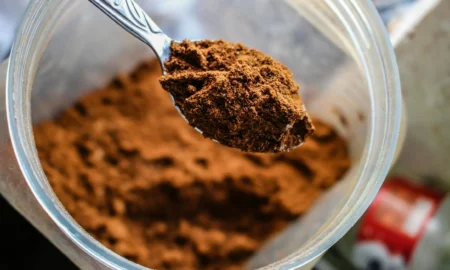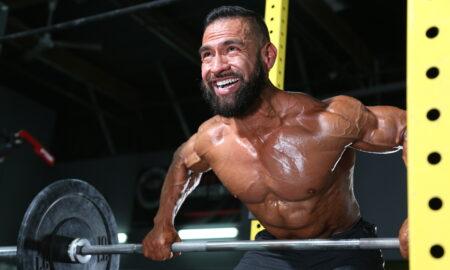Q: I’m considering competing in bodybuilding, but I need to decide whether to enter a natural or untested contest. I have no problems with steroids and steroid use, but here in the United States it’s illegal to use them, meaning I would have to move overseas to be untested. I was just wondering, how do you support yourself in your bodybuilding? Do you have sponsors that pay for all your stuff, or do you have a real job and do bodybuilding for more of a lifestyle?
A: I have to ask you, why would you consider competing with steroids when you can compete naturally? As you said, it’s now illegal to use steroids in this country. In fact, getting caught with steroids without a doctor’s prescription is a federal offense with penalties equivalent to using drugs such as cocaine and heroin.
I’m shocked that you would consider moving overseas just to be able to use steroids to compete. There are thousands of bodybuilders who use steroids in the United States, even though they’re illegal. If you really wanted to use steroids in this country, you could do so, but you’d be breaking the law.
The easier solution, of course, would be to forget the drugs and compete in natural bodybuilding contests instead. The fact that there are a dozen or so natural bodybuilding organizations in the country means you have many options if you decide to enter a contest.
If you think you’d be taking a step down by choosing to compete without steroids, I can tell you that you’re completely wrong. Natural bodybuilding contests are very, very competitive, with some incredible physiques onstage. I promote two natural bodybuilding contests every year in Chicago, and I’m amazed at how much more competitive each new contest is. The athletes are getting bigger and harder each year.
Years ago there were very few natural competitions. You were basically stuck with entering nontested shows, and you had to make the difficult decision of whether to use the drugs. If you didn’t use them, you were at a distinct disadvantage.
Today there’s no reason to even consider using steroids, in my opinion. Develop your physique naturally through hard training and good nutrition and compete against other natural bodybuilders in a drug-free competition. That’s what bodybuilding was originally supposed to be.
I support myself with a regular job and don’t make my living as a professional bodybuilder. Nor do most bodybuilders in this country or anywhere in the world. Many do it only as a hobby, and even a lot of professional bodybuilders have to do something else to make a living because they don’t make enough money as professional bodybuilders.
Only a dozen or so professional bodybuilders make six-figure incomes exclusively from the sport. Most of them are sponsored by supplement companies, but, as I said, the number of bodybuilders who can make that type of income is very limited.
During most of my competitive career I made my living by working a regular nine-to-five job. I competed on my own time and my own dime. It was strictly a labor of love for me.
For the past 10 years I’ve made my living primarily as a personal trainer. I absolutely love being a trainer because I’m doing what I enjoy, and my experience and knowledge as a bodybuilder benefits me in that profession. That’s why so many bodybuilders make such good personal trainers.
Over the past few years I’ve made income from the sales of my book Natural Bodybuilding and my DVDs and by writing articles for IRON MAN. I recently began promoting natural bodybuilding and fitness competitions, and that’s been a lot of fun and another source of income.
It’s your call, of course, but my advice is to stay natural and compete in drug-tested competitions. Why go to the risk and expense of using illegal drugs when you can just do it naturally? It is a lot of hard work, but in the end you’ll know that you, not the drugs, earned all the rewards.
Q: Thanks for all your great tips and advice for natural bodybuilding. I look forward to your column each month. I wanted to get your opinion on training frequency. I’ve been training for more than a year, and now I’m trying to lose fat and build a strong foundation. Currently I train three times a week: Monday (push), Wednesday (pull) and Friday (legs). When I train four days a week, I burn fat but I feel as if my muscles don’t get enough recovery time to really grow. When I train three times a week or less, I don’t burn as many calories, and I tend to gain weight. What are your thoughts on the best training frequency for building muscle? Can you recommend a better split?
A: I’ve always believed in losing fat primarily through my diet, not by burning calories at the gym. Heavy weight training is definitely a factor in getting leaner because you’re not only burning calories during your workouts but also building more lean muscle tissue, which will ultimately help you speed up your metabolism and stay lean. I think the key to getting leaner, however, is diet.
You’ve figured out that the best routine for you to build muscle mass and enhance your recuperation is to train three days a week with a day of rest between workouts. I think you could possibly add another day of training and still not overtrain.
I like taking a day off from training after two days of heavy workouts when I’m trying to get bigger. If you trained two days on/one day off/one day on/one day off, you’d be training each muscle group once every six days. That would let you train each bodypart a little more frequently, which would help you grow.
You could continue to split your muscle groups with the push/pull/legs program that you’re currently using, or you could try a different breakdown that would eliminate any overlapping of training the same muscles two days in a row. Here are two examples of how you could split your training program:
Day 1: Chest, deltoids, triceps
Day 2: Back, biceps
Day 3: Rest
Day 4: Legs
Day 5: Rest
Day 6: Cycle begins again
Day 1: Chest, biceps, triceps
Day 2: Legs
Day 3: Off
Day 4: Deltoids, back
Day 5: Off
Day 6: Cycle begins gain
To enhance your recuperation and grow between workouts, you need to follow a proper nutrition program. Eating enough protein will help the muscles rebuild after your heavy workouts. You should aim to eat 1.25 to 1.5 grams of protein for each pound of bodyweight. High-quality protein foods, such as egg whites, fish, chicken, turkey and lean red meat, are all great sources.
Complex carbohydrates are also very important for muscle growth, energy and recuperation. You’ll derive your energy for your workouts from carbs, so make sure you eat enough complex carbohydrates like oatmeal, sweet potatoes, whole-grain bread and brown rice.
If you feel that you’re not getting lean enough, cut back on your carbohydrate intake. Be careful not to cut back too much, though. Carbohydrates are often described as protein sparing. That means carbs should be used for fuel during exercise instead of protein. If you’re eating a very low-carbohydrate diet, your body will have to convert protein into energy by using amino acids for fuel. If you eat enough complex carbs, you’ll use them for fuel and not break down the protein you take in or, worse yet, actual muscle tissue, for your energy needs.
Editor’s note: John Hansen has won the Mr. Natural Olympia and is a two-time Natural Mr. Universe winner. Check out his Web site at www.NaturalOlympia.com, or send questions or comments to him via e-mail at [email protected]. Look for John’s DVD, “Natural Bodybuilding Seminar and Competitions,” along with his book, Natural Bodybuilding, and his training DVD, “Real Muscle,” at his Web site or at Home Gym Warehouse, www.Home-Gym.com. Listen to John’s new radio show, “Natural Bodybuilding Radio,” at www.NaturalBodybuildingRadio.com. You can send written correspondence to John Hansen, P.O. Box 3003, Darien, IL 60561. IM




















You must be logged in to post a comment Login